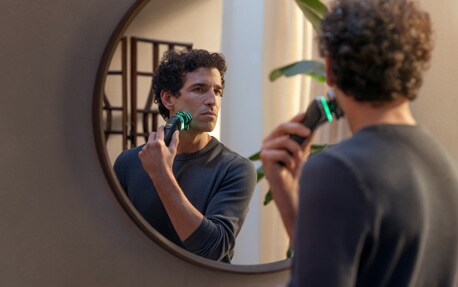
Shaving sensitive skin and oily skin

Did you know that beards can give you superpowers? Okay, so you probably won't gain super strength or the ability to fly, but growing a little facial hair can change others’ perceptions of you and more importantly, how you view yourself. The psychology behind beards is powerful!
From the values of ancient cultures to potential links to fertility, upping your beard game might just be what you need to shake up your world. Read on to understand why men grow beards, psychology and people’s perceptions, and how your facial hair can transform you.
Why do men wear beards? For any number of reasons! Some may enjoy the cathartic routine of trimming, edging and shaving, while others might be inspired by their favourite celebrity’s latest beard style. In addition, there are also a number of psychological factors that may make men want to wear a beard. Historically, beards have played an important role in the life of men. A well-kept beard in Ancient Egypt was seen as a sign of high status, with pharaohs using their facial hair to signify power. This was so important that the female pharaoh Hatshepsut wore a fake beard while she was ruling, donning artificial hair for two decades to emphasise her power.1 When wondering ‘What do beards mean?’ these ago-old values shouldn’t be ignored. The idea of authority being linked to facial hair has stuck in the psychology of humans, remaining relevant thousands of years later. Now, men with bold beards are seen as more masculine, dominant, and formidable, with an authoritative social perception from those around them.2 The psychology of growing a beard could also be based on social bonding. There are examples of soldiers and warriors through the ages growing beards together, as well as the more recent examples of sports teams (like the American Boston Red Sox) sporting facial hair as they approached a pivotal moment in their season.3 So, the social benefits of beards are:
Aside from the deeper psychology of beards, a lot of people love the look of facial hair. In fact, on the whole, heterosexual women find men with beards more attractive than those without.6 But why are beards attractive? One potential reason is a link between rugged facial hair and perceived fertility, making men with stubble seem more attractive to those around them.4 This link has come about because growing a beard requires testosterone – a hormone linked to male fertility – and the bushier the beard the more testosterone people think you have flowing through your veins. It's just nature! Of course, what one person likes isn’t going to be true for everyone. Different cultures and societies will have different preferences, too. In Sikh culture, for example, having a beard is a religious obligation more than anything.5 It’s also important to note that not everybody likes the same style of facial hair. When looking into ‘Why are beards attractive?’, female perception favours heavy stubble over all else, including full beards and lighter stubble.6 Interestingly, men prefer a clean-shaven look when judging other men’s facial hair, with light stubble claiming a close second.7 So, if you’re using the psychology behind beards to up your game, it’s worth having a good styling routine to keep your beard under control. Try the Precision Beardtrimmer 9000 Prestige for complete control over your length, using the easily adjustable dial to switch through 30 different settings.
Moving on from what do beards mean in society, are there any other answers to the question of ‘Why do men grow beards?’ Psychology suggests that facial hair signifies masculinity and dominance, but we haven’t yet looked at how a beard can change how you feel about yourself. Many men find that facial hair boosts their confidence. Beards can hide features that might make you self-conscious, like scars, spots, and even the shape of your jaw or chin. With a beard, you have control over your look, which can make you feel more attractive and boost your self-esteem. Knowing the psychology of growing a beard, it’s not hard to imagine that the perceptions of others can boost your confidence, too. If those around you view you as dominant and wise, it won’t take long until you start to believe them.
Across the West, beards have been making a comeback, and with the social benefits of a beard, it’s not hard to see why. So, to beard or not to beard? That is the question. Sweeping others’ opinions to the side, the way you style your facial hair should be entirely linked to your personal preference. If a bit of stubble makes you feel smart, getting to grips with beard grooming for the modern professional could be just what you need to boost confidence in the workplace. It’s all about how your look makes you feel. Simple! If you’d love to embrace facial hair but aren’t sure how to get started, take a look at these popular beard styles for inspiration. We also recommend investing in some trusty tools that’ll let you play around with your look until you perfect your facial hair. Get started with the OneBlade 360 with Connectivity. The unique single-blade technology makes this a versatile shaver for any length of hair, while the connection to the Philips Daily Care app lets you preview different looks and personalised suggestions based on your routine. It’s easy to use, easy to clean, and adjusts to suit your look for facial hair you can be proud of. Sources 1 Beards and moustaches have a weirder history than you think, National Geographic 2 Men’s facial hair preferences, National Library of Medicine 3 Five Reasons Why the Red Sox Grew Their Beards, PsychologyToday 4 Women prefer men with beards, Men’s Health 5 Religious clothing and personal appearance, Pew Research 7 Preferences of men’s facial hair from the perspective of both sexes, National Library of Medicine